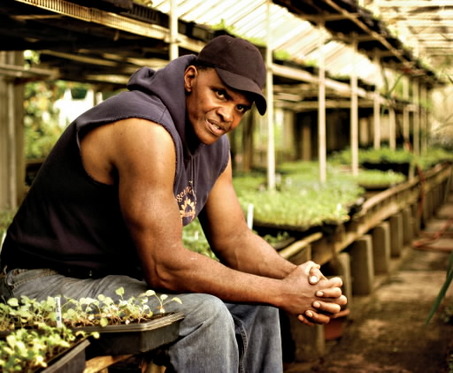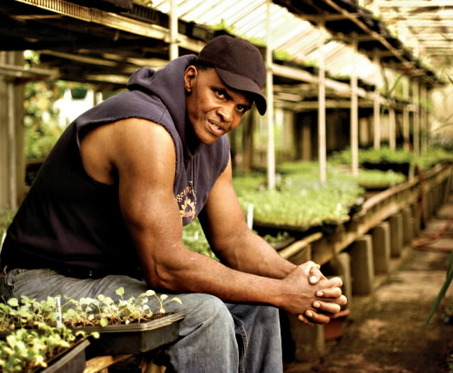 This weekend I caught up with Will Allen who was keynoting the always excellent Northeast Organic Farming Association’s Annual Conference in Amherst, MA. He’s founder and CEO of Growing Power, the country’s premier grassroots urban gardening program, and also a MacArthur Genius Award Winner and former pro-basketball player.
This weekend I caught up with Will Allen who was keynoting the always excellent Northeast Organic Farming Association’s Annual Conference in Amherst, MA. He’s founder and CEO of Growing Power, the country’s premier grassroots urban gardening program, and also a MacArthur Genius Award Winner and former pro-basketball player.
Growing Power demonstrates growing methods through on-site workshops and hands-on demonstrations, and has farms in Milwaukee and Merton, Wisconsin, and Chicago, Illinois, where they grow vegetables, fish, bees, livestock, worms, and more. They have also established satellite training sites in Arkansas, Georgia, Kentucky, Massachusetts, and Mississippi.
Erik Hoffner: What’s the youth component’s importance to Growing Power?
Will Allen: We started out as a youth serving organization. If there wasn’t a youth program from the beginning, I probably wouldn’t be doing this work now. But I quickly realized that we needed to also get adults involved, that it had to be a multi-generational effort at engaging the community. The fastest way to do that, though is through the youth, and they bring in the adults. A program like ours can then be quickly regarded as an asset by everybody in a community if it anchors people, and is a preferred place for their kids to be.
EH: What’s the gender breakdown of the young people involved in your programs?
WA: This new kind of agriculture is a majority women’s movement. I look around when I’m at events like this one this weekend, and by and large, it’s women.
EH: What do the kids go on to do after they work in Growing Power’s ‘youth corps’ apprentice program?
WA: We work with some of these kids from the ages of 8 until they go to college, and many do go to college, and part of their success could be because we focus on academics for 2 hours every day. We require the kids to write and read about the hands on stuff they’ve done that day. It spurs them on to learn more, dig deeper. They might get curious about microorganisms, for example, and go learn about them. They get excited about it. I think that’s what we do best, both the kids and the adults, we inspire people to want to go do something, start a project, not just sit on a couch.
EH: Have Growing Power participants gone on to start gardens of their own?
WA: Yes, but better yet, more than half of our employees are former Youth Corps or Interns. Some others of our staff come from among the 2,000 volunteers we have.
EH: Where else have Growing Power alums gone to grow?
WA: We’ve trained thousands of people, and they started hundreds of programs around the country. Many more are now coming to us 3 days a month for our Commercial Urban Ag Training program. It’s 5 months, half of it hands-on, the other half’s classroom on how to start a small scale farming operation.
EH: On what economic model?
WA: Non-profits and for-profits both. Since we started this 3 years ago, we’ve seen a lot of non-profits, in part because today, non-profits need ways to make money. A program like this earns a lot more revenue than traditional youth development programs.
EH: Where are your alums growing, in urban settings only, or are they going rural too?
WA: Both. Suburban too. Many African Americans who said they’d never farm again are going back to the land, even to their ancestral rural lands in the South. Ten years ago, they would never have come on board with this revolution. They’d say, “that’s ‘slaves’ work.” So it’s very satisfying, and it’s important, to see this change because they often represent the most food insecure communities.
So we’re starting to see this as a multi-cultural, multi-generational grassroots ‘revolution’ – even the top-down types, the corporations and politicians and universities want to get on board, after fighting small scale farming for so long, and that’s fine, we need everyone. We need millions of new farmers doing small-scale agriculture.
EH: What’s the deal with land tenure?
WA: Tenure is so important. It’s why when we incorporated Growing Power, we became a land trust, because we wanted long-term tenure. In order to grow good food we have restore the land, which has been so contaminated. That means building soil, and it takes time. I wouldn’t start a project on rented land unless I could get a 10 year lease.
But renting is viable. Land is expensive, and if you wait around to buy land, the community’s going to starve.
EH: If you could change one thing about how cities are run, what would it be?
WA: All city planners should be required to incorporate green space and food growing into their urban plans. The American Planning Association’s magazine new issue, it’s all about food. Ten years ago, that topic was unheard of. So that’s progress.
EH: How important is networking to Growing Power’s work?
WA: Very important. We share everything we learn, pass it on, and hope they’ll pass it on to others. That’s how change happens, and a revolution comes about. I’m calling it that now, the Good Food revolution, because that’s exactly what it is.
Visit Growing Power here. Also, enjoy an audio interview with Will Allen from this weekend at Sea Change Radio.


